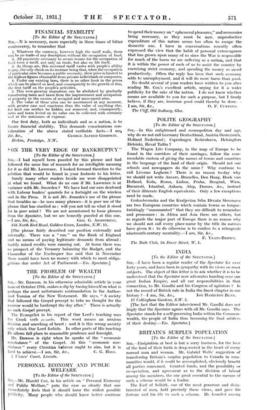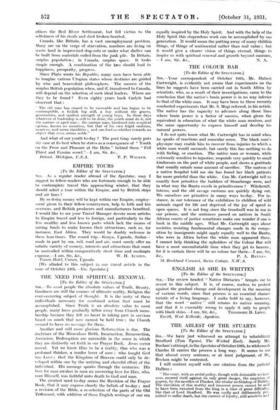BRITAIN'S SURPLUS POPULATION
[To the Editor of the SPECTATOR.] Sin,—Emigration at best is but a sorry business, for the love of the land of their birth is deep-rooted in the heart of every normal man and woman. Mr. Gabriel Wells' suggestion of transferring Britain's surplus population to Canada in com- munities would, if it could be accomplished, obviously benefit all parties concerned. Granted funds, and the possibility or co-operation, and agreement as to the division of labouf among the members, the one great essential to the success of such a scheme would be a leader.
The Earl of Selkirk, one of the most generous and disin- terested of men, held precisely these views, and gave his fortune and his life to such a scheme. He founded amone others the Red River Settlement, but fell victim to the selfisimess of his rivals and died broken-hearted.
Canada, like Britain, has a vast unemployment problem. Many arc on the verge of starvation, numbers are living on waste land in improvised dug-outs or under what shelter can be built from materials culled from the junk pile. In Britain, surplus population ; in Canada, surplus space. It looks simple enough. A combination of the two should lead to happiness, prosperity, progress.
Since Plato wrote his Republic, many men have been able to imagine various Utopian states whose destinies are guided by wise and benevolent philosophers. The success of the surplus British population when, and if, transferred to Canada, will depend on the selection of such ideal leaders. Where are they to be found ? Even eighty years back Carlyle had observed that : " The old man has ceased to be venerable and has begun to be contemptible, a foolish boy still, a boy without the graces, generosities, and opulent strength of young boys. In these days whatever of leadership is still to be done, the youth must do it, not the mature or aged man : the mature man, hardened into sceptical egoism, knows no monition, but that of his own frigid cautions, avarices, and mean tiznidities ; and can lead no whither towards an object that even seems noble."
Anti what of our youth to-day ? The poet Gray surely puts the case at its best when he states as a consequence of " Youth on the Prow and Pleasure at the Helm " behind them " Fell Thirst and Famine scowl."—I am, Sir, &c.,







































 Previous page
Previous page